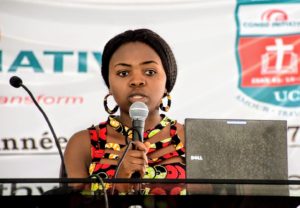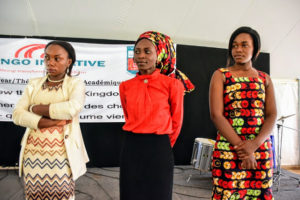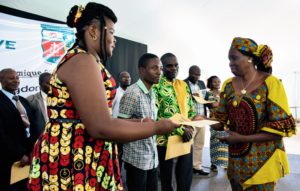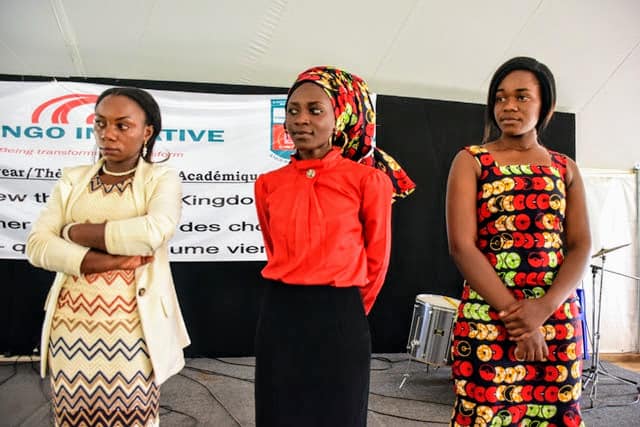
As we know, people around the world are joining together in the continued fight for women’s rights, equal pay, security, and justice. In the Democratic Republic of Congo, UCBC’s Women’s Voices has entered that fight, encouraging students and the wider community to challenge the pervasiveness of sexual violence against women and the norm of undervaluing and undermining women in leadership roles.
Every March, the student-led group brings together students, parents, and community members to discuss pressing issues in women’s rights and equality. This year’s conference, organized around the theme, “Invest in Women’s Power for Transformational Leadership,” couldn’t have come at a better time.
Women continue to face a dominant, patriarchal culture where roles of political leadership, moral authority, social privilege and control of property remain dominated by men. As Esperance Kazi, President of One Girl, One Leader (OGOL), a local women’s organization explained, “In Beni Territory, there is not a single woman who has been nominated as a delegated officer in six rural municipalities.”
Justine Masika Bihamba, founder of Synergie des Femmes, a women’s organization based in GOMA, DR Congo, wrote in the Guardian last year:
“We women have a huge influence in our communities yet we are almost entirely excluded from Congolese political life. A lot of this is down to the traditional role of women and a government that ignores article 14 of our constitution, which demands gender equality. Only 8% of parliament is female and we have been almost completely left out of peace-building efforts – apart from the occasional inclusion of one or two women to take notes while men speak. According to the International Peace Institute the chance of lasting peace increases by 35% when women are included in talks, but during times of war, women’s political participation tends to decrease while sexual violence increases.”
A growing concern exists about the disadvantages women face in securing leadership roles within their communities, including as elected officials. Women find it difficult to secure the funds needed to run for elected office, and political parties are not supporting female candidates. Unfortunately, as Kazi noted, “equality is not a given,” and even though efforts are made to increase the visibility of women in leadership, a significant disparity remains between men and women in leadership across society. Thus, we must ask ourselves Kazi continued, “What can we do to make equality effective in Congo?”

Women’s Voices is actively responding to this question, promoting equality and challenging gender discrimination. Members often visit secondary schools to encourage female students to dream big, pursue higher education, and consider themselves as potential leaders who can lead change in Congo.
Students like Hekima Kalumni, a third-year agribusiness student and outgoing secretary of Women’s Voices, spoke to the audience during the conference held at UCBC’s Hope Chapel Tent. In a moment of solidarity, she proclaimed, “We will not wait for the world to tell us who we are!” For students like Kalumni, waiting on the world to change is not an option. Surrounded by a supportive community like Women’s Voices, she and other women in Congo know now is the time to discover their identity as leaders.
In a nation facing political and social instability, investing in the lives of women and girls is vital to sustained peace, equality and development. UCBC is working towards an enrollment and graduate class made up of 50% women. In the past, the enrollment ratio has been close to this mark; however, it dropped this past year to 33% in part due to the disproportionate effects of regional insecurity on women. And, though we celebrate a 43% female graduate ratio, we continue to invest in current and future female students and provide opportunities.
Learn how you can support women at UCBC by investing in women’s scholarships.
[symple_box color=”black” fade_in=”false” float=”left” text_align=”left” width=””] Special thanks to Eastern Congo Initiative for awarding 33 female agribusiness students with scholarships for one year. Parents were invited into the ceremony to receive the awards given out by UCBC’s Vice Rector, Dr. Honoré Bunduki Kwany. [/symple_box]
Special thanks to Eastern Congo Initiative for awarding 33 female agribusiness students with scholarships for one year. Parents were invited into the ceremony to receive the awards given out by UCBC’s Vice Rector, Dr. Honoré Bunduki Kwany. [/symple_box]


Leave a Reply